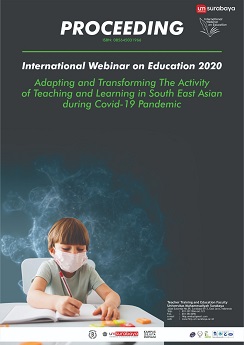What platform makes students enjoy the learning during covid-19 pandemic?
Abstrak
Abstract.
Covid-19, which is pandemic throughout the world, including Indonesia, forced
face-to-face learning to be transformed into distance learning. Distance learning done through various platforms. This research aims to find out what platform was the most enjoyable to use during learning for students. The sample were 119 students from the Family Welfare Education Study Program, Engineering Faculty, Universitas Negeri Jakarta. The study conducted from April to May 2020. The research used descriptive qualitative methods. The results showed that 45% of students chose Google Classroom as the most enjoyable platform to use during distance learning, 28% of students chose Zoom, 9% of students chose WhatsApp, and the rest chose on several platforms such as Edmodo, Slido, Quizizz, Schoology, Seesaw, and Google Meet. The main reason for choosing the platform as seen from the effectiveness and ease of access. To keep distance learning enjoyable for students, they create coping strategies for themselves. Respondents did some
things such as journaling, always thinking positively, interacting with friends and family, creating an atmosphere of learning like being in class, and not delaying assignments. When there is free time, they often listen to music, watch movies, play with pets,or get more rest. Keyword: distance learning,joyful learning, enjoyable platform used, coping strategies
Referensi
R. Nuraini, ―Kasus Covid-19 pertama, masyarakat jangan panik,‖ 2020.
Kompas, ―Cegah corona, gubernur Anies liburkan sekolah di DKI selama 2 pekan,‖ 2020.
Y. Andri, ―Mulai senin, pembatasan transportasi umum di Jakarta berlaku,‖ 2020.
M. M. El Iqbali, ―Implementasi Media Pembelajaran Berbasis Teknologi Informasi dan Komunikasi dalam Distance Learning,‖ TARBIYATUNA Kaji. Pendidik. Islam, vol. 3, no. 1, pp. 29–40, 2019, doi: 10.1017/CBO9781107415324.004.
F. Firman and S. R. Rahman, ―Pembelajaran Online di Tengah Pandemi Covid-19,‖ Indones. J. Educ. Sci., vol. 2, no. 2, pp. 81–89, 2020, doi: 10.31605/ijes.v2i2.659.
E. W. Pratiwi, ―Dampak Covid-19 Terhadap Kegiatan Pembelajaran Online Di Perguruan Tinggi Kristen Di Indonesia,‖ Perspekt. Ilmu Pendidik., vol. 34, no. 1, pp. 1–8, 2020, doi: 10.21009/pip.341.1.
K. R. Heggart and J. Yoo, ―Getting the most from google classroom: A pedagogical framework for tertiary educators,‖ Aust. J. Teach. Educ., vol. 43, no. 3, pp. 140–153, 2018, doi: 10.14221/ajte.2018v43n3.9.
S. Iftakhar, ―Google classroom: What works and how?,‖ J. Educ. Soc. Sci., vol. 3, pp. 12– 18, 2016.
D. Datta, P. Pratim Datta, and K. K. Majumdar, ―Role of social interaction on quality of life.‖ Accessed: May 31, 2020. [Online]. Available: http://www.who.int/substance_abuse/research_tools/.
V. Amati, S. Meggiolaro, G. Rivellini, and S. Zaccarin, ―Social relations and life satisfaction: the role of friends,‖ Genus, vol. 74, no. 1, Dec. 2018, doi: 10.1186/s41118-018- 0032-z.
H. Yaribeygi, Y. Panahi, H. Sahraei, T. P. Johnston, and A. Sahebkar, ―The impact of stress on body function: A review,‖ EXCLI Journal, vol. 16. Leibniz Research Centre for Working Environment and Human Factors, pp. 1057–1072, Jul. 21, 2017, doi: 10.17179/excli2017-
T. J. Shors, ―Learning during Stressful Times,‖ Learning and Memory, vol. 11, no. 2. NIH Public Access, pp. 137–144, Mar. 2004, doi: 10.1101/lm.66604.
J. Gustems-Carnicer, C. Calderón, and D. Calderón-Garrido, ―Stress, coping strategies and academic achievement in teacher education students,‖ Eur. J. Teach. Educ., vol. 42, no. 3, pp. 375–390, May 2019, doi: 10.1080/02619768.2019.1576629.
M. C. Pascoe, S. E. Hetrick, and A. G. Parker, ―The impact of stress on students in secondary school and higher education,‖ International Journal of Adolescence and Youth, vol. 25, no. 1. Routledge, pp. 104–112, Jan. 02, 2020, doi: 10.1080/02673843.2019.1596823.






